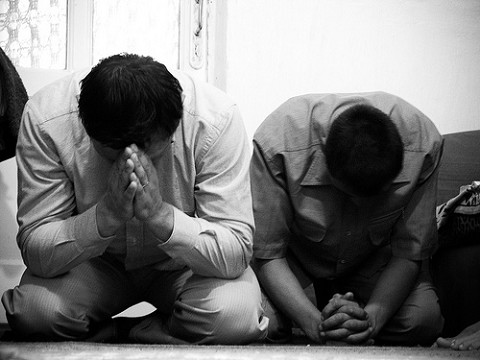

Authority: Its use and abuse
If you pay attention, you’ll notice many Christians dancing this strange little tango that I call “the Dance of the Burned Believer.” I’ve danced it myself more than once.
I grew up without a good example of a leader I could trust. The second job I ever had was in the Dominican Republic.
…
By Seth Barnes

If you pay attention, you’ll notice many Christians dancing this strange little tango that I call “the Dance of the Burned Believer.” I’ve danced it myself more than once.
I grew up without a good example of a leader I could trust. The second job I ever had was in the Dominican Republic.
It started when the ministry I was with gave me a Dominican partner who deeply resented me. I was, in his mind, not an American consultant but an imperialist spy.
My engagement there ended two years later with a board member intervening in a hurtful way and then explaining his actions by saying, “I don’t hate you, Seth.” (Hey, thanks for the consolation prize – no harm, no foul, no hate).
Next was a job in Virginia that ended when the board fired my boss and brought in a bureaucratic replacement whose idea of leadership was to correct the reports you had written with a red pencil, actually making them worse than they were when you originally wrote them.
After several months, he gave me the option of being fired or laid off. I still don’t understand his reasons – my guess is that I was probably classified as damaged goods. Subsequently, I spent half a year on unemployment compensation and working part-time jobs.
Next, there was the ministry I helped start with a friend in Florida. After two years, he replaced me.
After all that, could you blame me if I didn’t trust authority? I remember when, at age 29, my Mom asked me, “Have you considered looking for a mentor?”
“Ha!” I thought, and I brushed her off, “Don’t need one.”
Why would I trust anyone? The only examples of authority I’d seen were bad ones.
And so, I danced the Dance of the Burned Believer.
The only problem with that solitary dance is that, though I didn’t realize it at the time, I needed help in getting through an important phase of my spiritual growth – someone to help wake me up to the kingdom of God. I needed help in recognizing my identity and role in the kingdom. And what I really needed was a proper example of authority.
Eventually, as the result of pain and failure, I went looking for a mentor I could trust. Years later, after being turned down by other leaders, I found one in Andrew Shearman. He helped me wake up to the kingdom. He showed me what grace-filled, covenantal living looks like. He introduced me to a proper perspective on authority.
Submission to loving authority is the basis for Body life. God gave it to Adam and has been giving it to his servants ever since. He even gives it to hard-hearted rulers like Pharaoh, Darius, and Nebuchadnezzar. Jesus delegated all authority to his disciples before he sent them out two-by-two (Matt. 10).
Rebellion against authority is the original sin. Your rebellion tells God, “I don’t trust you.” It leads to a broken body. Your rebellion keeps the body of Christ from functioning.
3 Reasons why we rebel
Why do we rebel? There are many reasons, but here are three:
- We’ve been wounded by the bad example of authority abuse.
- We’ve not seen a model of a good authority figure to emulate.
- We’ve not learned how to trust (1 Peter 2:13-21).
Consequences of rebellion
As rebels, we align ourselves with the example of the enemy and we ourselves become abusers, never showing our followers how to trust.
- We become inadvertent terrorists in the kingdom (like the Joker).
- We build toxic work places. People aren’t safe, so they learn to scheme and manipulate.
- We don’t ever learn how to follow Jesus’ servant leadership model.
An entire generation of young people is dancing the Dance of Burned Believer. Your leaders have failed you. Your authority figures have not served you. You’re afraid of authority. The sad result is a spiritual spasticity in the body of Christ. It’s a generation that longs for community, but hasn’t learned how to commit.
Jesus wants a reformation. He wants to re-form us and connect us. He wants to build a tribe that gets what it is to empower and to actually submit. He is looking for leaders who will be broken for their followers. He gives us the qualifications for authorities in 1 Tim. 3. He’s looking for followers who will implement Hebrews 13:7&17.
How to come under authority
So how do we join this reformation? How do we establish a new pattern? Here’s how it worked for me:
- I repented for my failure to trust (which is just rebellion).
- I chose to fight in the opposite spirit by practicing commitment.
- I looked for leaders I will risk my trust on. I shared my dreams with them. I asked them questions.
- I now try to wield authority as a servant to empower the believers for works of service.
What’s been your experience with authority? The sad fact is that we’ll never reach our destiny until we wrestle through this issue and learn to entrust ourselves to others.



What if the leader you find yourself under has been so abusive in his leadership that it has become an integrity issue, and has no credibility? Do you continue to submit? Do you leave and seek a leader you can trust to follow? Attempts to confront this abuse has not worked only further empowerment of unhealthy treatment that grieves staff and spirit.
It’s such a tough issue. Like so many people, I have had some pretty bad experiences of authority and trusting isn’t easy. When people in authority hurt or let me down, I have noticed I pull back from being so sure of God because He is the ultimate authority. I make God in my mind like people.
In there is something of a key though. Trusting people isn’t easy but if you trust yourself to God to care for you, He’s there to vindicate and help you when it’s tough. I had a picture about a year or so back of me surrounded by brick walls in a little round tower. I had built this myself to keep me safe and the bricks were made of hurts and of statements of “no more.” There was no door.
Jesus came to me in the picture and asked if He could tear my walls down. I didn’t want Him to at first so I said no but asked Him to help me say yes, to soften my heart. A couple of hours later He asked me again “can I tear your walls down?” I gave in and agreed very reluctantly, but couldn’t move out of the rubble after He had. I just didn’t feel safe.
He said He had another tower I could hide in. It was the tower of His Name and when the righteous run into it, they are safe. He said I could still be hurt in there because I was still living in the world, but He could be with me there and His protection would cover me. If I stayed locked away in my own tower, He couldn’t reach me.
I think if I can’t find a leader to trust, I can trust God in them. If I trust Him and the leader fails me and I fall, it won’t be fatal. God will lift me up by His mighty hand. His word says so. But I have to be trusting in His Name, living in His tower, and not pinning my hopes on the leader to do the saving.
Hi Seth.
Your chronology brought back memories as you and I worked together at the place where the “left hand of fellowship” was offered to both of us. 🙂
Trust is a journey.
I’m still on it but it is so much easier with covenant friends.
Love you.
Excellent blog Seth. My relationship with authority figures has been both good and bad. I realize those in authority over me will only love and lead to the capacity they have been shaped by the previous authorities above them.
Example – If my authority didn’t have loving parental figures then that person will lead with knowledge, and limited insights into how to love well.
Unfortunately leading and loving are not always synonymous and when they are not, it is as dry as toast without butter.
The love (butter) is what makes is wonderful.
Love and trust are partners and it is rare unfortunately to find the blending of open hearted leaders.
What I have learned through the years is accept whatever is offered and if there is a void present, then fill it with love and pass it along to those you lead.
Yeah I have had a hard time with authority in my life.
As a young girl I was molested by a policeman, I would say he was a man of authority. My dad was an alcoholic, a rager and all that goes along with that, again authority figure in my life. A teacher in high-school was “sexually inappropriate”, authority for sure. Then as a christian woman in church the “Elders” of my church, authorities in the word, tell me they do not believe women are as equal as men in the kingdom.
The Lord has worked on my “issues” with authority, I have had to forgive those who have abused their authority. I have to say He is still working on me in that area. I know the Lord has set up biblical authorities over me for my protection and leadership in my life.
I am still learning to trust. (Still in process)
I am currently UN-learning many things which were taught to me while under the authority of someone I greatly respected and worked hard for.
Being relatively new to the kingdom of God myself, it never dawned on me back then to ask, is this guy about the Kingdom of God, or his own personal kingdom? I think it was a mixture of both.
Good spiritual fathers and mothers will point to Jesus and His authority, not their own. Sometimes it seems like many Christian leaders out there are hungering to be the next conference-speaker, the next cool blog writer, the next hot author, the next mega-church pastor, the next this, the next that. I’ve rubbed shoulders with many people in authority who relished seeing their name in lights.
Seth, you have proven multiple times to be the kind of leader worthy of authority. My guess is that you really don’t want more authority as much as want to see your spiritual sons and daughters experience astonishing fruitfulness and epidemic multiplication of their own, i.e. grow in their own legitimate authority.
Those who don’t crave authority are the ones worth of it?
Dear Seth
Thanks to our Lord Jesus Christ for holding our hands and taking forward. Authority what I learned as a new beliver (two years old) is to serve God and God’s people. Any thing else is just abuse and your growth will stop. Let us not forget “Moses” he was the humblest soul on the planet that time and till toady God like Humbleness and true humility
As from Chapter Genesis when Abraham met the “King of peace” Melchizedek. they have one thing common and it was that both prayed to same God the Creator of heavens and earth.
Seth if we search our hearts and find our LOYALTY to only God our Father and Jesus Christ. It is more likely we will be at right place at right time.
And we do not not have to follow false authorities because we have only one high priest our Lord Jesus Christ and our best teacher Holy Spirit. Who led Paul, Peter , barnabas.,
Seth,
Your blog today struck home. Thanks for sharing & encouraging us Burned Believers!
thanks for writing this. I was a burned believer but thanks to you and also, I believe, my college ministry, I am able to forgive and move forward under proper loving authority, while also learning how to walk in the authority I’ve been given under Christ.
great blog dad. always encouraging to know that failing is a part of the process. thanks for always showing your process and being a good leader and dad. love you!
Such healing words, thank you for sharing. Looking back I can see how God has used difficult circumstances and authority figures whose own ‘burned believer’ dance had devastating consequences for me. Recovery is a daily process. I am experiencing the healing that comes through forgiveness.
“There is a joy in the journey…”
Cheryl
Jason, you need to get a word from God. Sometimes you bail and sometimes you tough it out. Here’s a great book on the subject: “The Three Kings”
http://www.amazon.com/Tale-three-Kings-Study-Brokenness/dp/0842369082/ref=sr_1_4?ie=UTF8&s=books&qid=1259008916&sr=8-4
That was a great book, “The Three Kings” and really helped me with the issue of authority in our lives.
Love this blog – full of things to ponder. And interested to read this book too … seems a bit like that Graham Cooke message I like so much – why wounded & betrayed believers are so useful in the Kingdom. But i like your emphasis on commitment to a community as part of the antidote. Interesting that counselors say this is the antidote for emotional trauma of any kind – relationships that require us to live without masks and trust again. I loved Graham’s mindset when he said: “i just refuse to live without trusting people, I’d rather be burned – because with Jesus, I can always heal – but I refuse to live without love and be a person who doesn’t embrace the best of people.”
yes, I want to be discerning and find leaders, communities that are life-giving and hopefully “worthy” of my trust – but i strive for that “unoffendable” attitude. Because chances are, we have all been both offendED and offendER. I liked Rozy’s comment – accept what is offered, and fill up any void with love so you can pass it on to those you lead… great stuff to ponder…